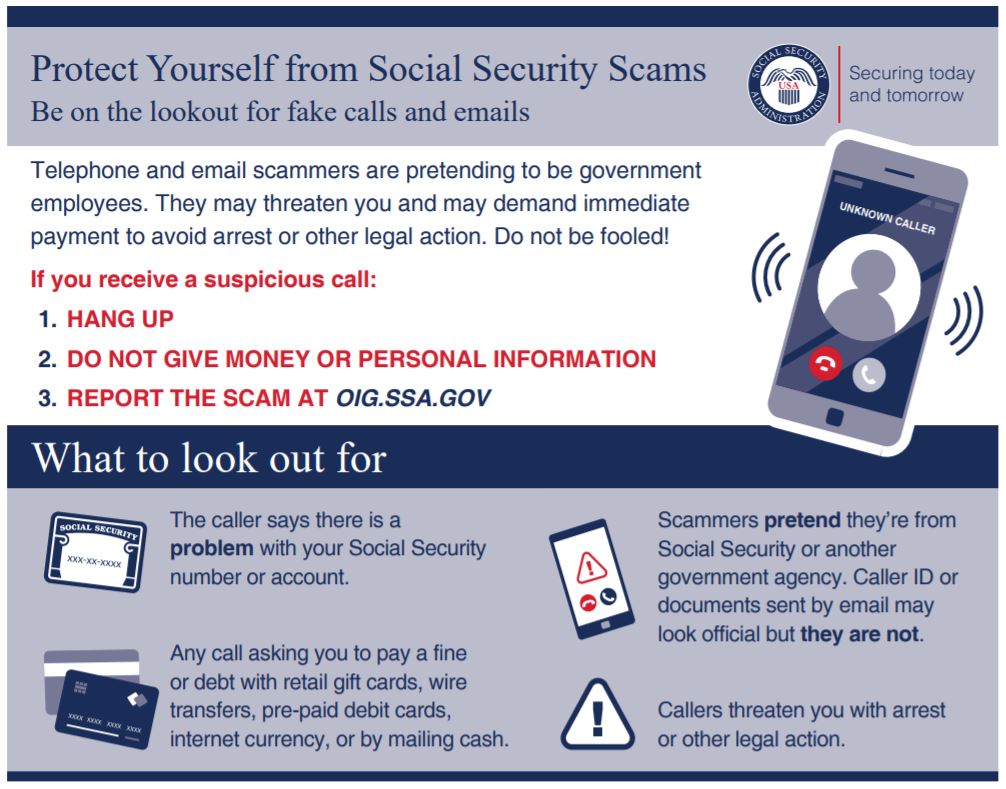The Social Security Administration and the Office of the Inspector General (OIG) once again joined forces to raise public awareness about Social Security imposter scams during the second annual ‘Slam the Scam’ Day on March 4, 2021. Social Security scams – in which fraudsters mislead victims into making cash or gift card payments to fix purported Social Security number problems or to avoid arrest – are the #1 type of government imposter fraud reported to the Federal Trade Commission and Social Security.
The agency has made concerted efforts to address this issue, including partnering with other Federal and State agencies to identify and pursue scammers, increasing employee and public outreach and education, raising awareness through marketing in post offices nationwide, and maintaining a Social Security/OIG workgroup to maximize resources and ensure a cohesive response.
“I am deeply troubled that crooks are deceiving Americans and using fear tactics to trick people into providing personal information or money,” said Social Security Commissioner Andrew Saul. “I urge everyone to remain vigilant, hang up on these fraudsters, and go to oig.ssa.gov. to report any attempted scam.”
Criminals are sophisticated and there are many variations of this fraud scheme. For example, scammers may call or email saying they are from Social Security and that the person’s Social Security number is suspended or was used in a crime. The caller identification may be spoofed to appear as a legitimate government number. They may text or email fake documents in attempts to coerce people to comply with their demands. In recent twists, thieves even use real Social Security and OIG official’s names and send pictures of fabricated government ID badges.
Social Security will never tell you that your Social Security number is suspended, contact you to demand an immediate payment, threaten you with arrest, ask for your credit or debit card numbers over the phone, ask for gift cards or cash, or promise a Social Security benefit approval or increase in exchange for information or money.
“We are working with the Department of Justice and law enforcement agencies across the United States to combat Social Security imposter scams—but our best weapon in this fight will always be awareness,” said Inspector General Gail S. Ennis. “I want to thank the many agencies and organizations that have joined us in our effort this year to alert Americans to hang up on suspicious calls, and talk to their family and friends about phone scams.
Social Security employees do occasionally contact the public by telephone for business purposes. Ordinarily, the agency calls people who have recently applied for a Social Security benefit, someone who is already receiving payments and requires an update to their record, or a person who has requested a phone call from the agency. If there is a problem with a person’s Social Security number or record, Social Security will typically mail a letter.
For more information, please visit https://www.ssa.gov/fraud/.
 Benefits.com Advisors
Benefits.com Advisors
With expertise spanning local, state, and federal benefit programs, our team is dedicated to guiding individuals towards the perfect program tailored to their unique circumstances.
Rise to the top with Peak Benefits!
Join our Peak Benefits Newsletter for the latest news, resources, and offers on all things government benefits.




















